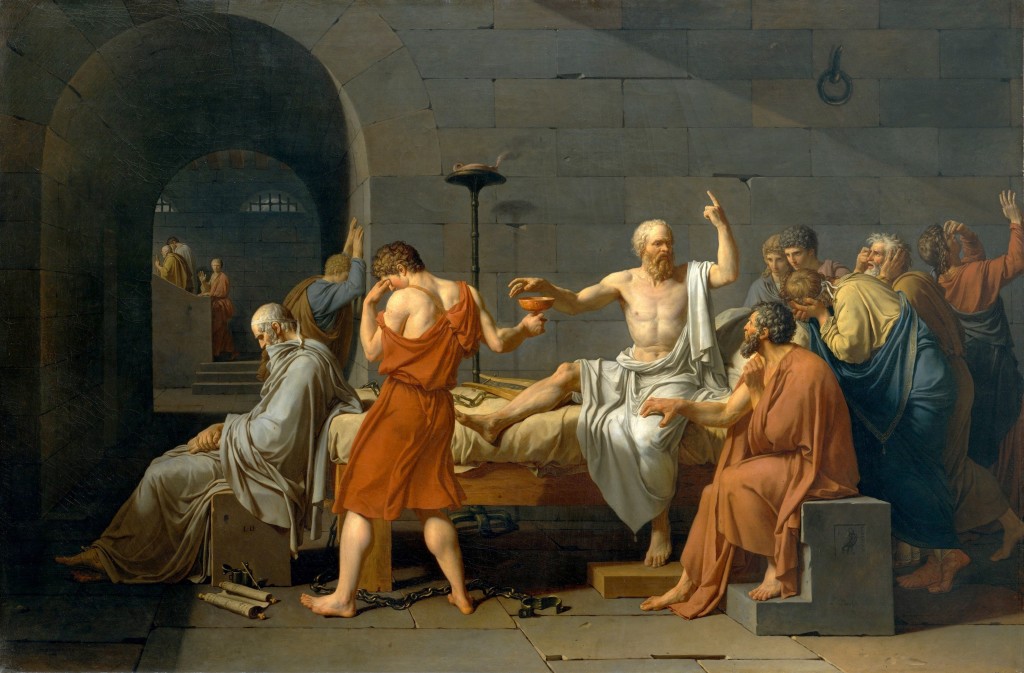
There are all sorts of think-pieces on the decline of the humanities in American universities. No one seems to be denying they are in decline; the disagreement is as to why. This piece, from the libertarian organization FEE, suggests the humanities’ fate was sealed when “leftist politics” took over the classrooms. Somewhere, I’m sure, there is a piece arguing that right-wing conservatism has killed the humanities. On a more mundane level, it’s hard to dismiss the argument that humanities degrees just aren’t practical: as someone with a humanities degree, and who won’t be making six figures any time soon, I can attest more than I’d like. But none of these arguments seem really sufficient to explain why the humanities are being taught to ever-emptier classrooms.
The humanities have always been radical. The citizens of Athens knew this. To read The Apology is, to a certain extent, very much like reading that FEE piece, above. Socrates was an iconoclast. Paul was an iconoclast; so too Augustine. The author of the FEE piece makes a good point: the humanities have become so nepotistic, self-referential, and arcane—so anti-radical, if you will—that they have disconnected from real life—”‘they serve no constructive public function.'” But to reduce this to an argument for or against one strain of American political thought is to lose sight of the real threat to the humanities—and I do think there is one.
Likewise to reduce the issue to a false dichotomy, as between the humanities and the STEM fields. It’s a fallacy I am guilty of committing myself. Properly understood, the humanities are not at enmity with the so-called more “practical” fields. Theirs is—can be, should be—a complementary relationship. This is not a zero-sum game: we should not think that just because there are more engineering majors, and fewer English majors, the humanities are dead. More on this below.
The humanities are founded on the idea of humans as relational beings. Who are we in relation to God and the divine; to our fellow humans; to other creatures; and how does this inform how we interact? Through much of the timeline of Western academic tradition, the answers were theistically oriented.* Our lateral relationship to God or the gods identified our humanity and informed our other, horizontal relationships. This is a key theme in Christian tradition, of course; it’s also the key theme of The Aeneid and the founding mythos of Rome, and it worked itself out in very practical ways in the Roman conquest of the Mediterranean world. Later, post-Reformation, the answers reoriented atheistically: our core identity as human informed our other relationships, including our relationship to the divine. Fundamentally, discussions of humanity and identity were still framed by questions of relationship, interaction, and responsibility. In Hobbes’ world, life is “solitary, poor, nasty, brutish and short” until tamed and ordered in relationship. Read Orwell and there is an assumption of civic responsibility as part of being basically human.
The discussion of what constitutes “civic responsibility” and how we are obliged to interact in communion as humans beings is, of course, a can of worms, and deeply dependent on personal ideology and conviction.
At some point along the line, we figured it was easiest to drop the discussion. The humanities are dying as a result.
The humanities set us in context. When we learn the humanities, we are learning to see beyond ourselves—learning to understand ourselves in relational terms. This doesn’t require a history degree. Any degree, any job may be humanitarian (read about these engineering students who traveled to Kenya for a water-sanitation project). The problem is that Self is always trying to set up its own cult, devoid of context, divorced of relationship and responsibility. When we teach only in terms of self-fulfillment, self-actualization, self-importance—because it’s easier and/or because we honestly place Self above all else—we are teaching that the humanities don’t matter. It’s not tied to any one political ideology. It isn’t about getting leftist or rightist politics out of the classroom. It’s a basic and perennial human problem. We’ve always tended to glorify Self at the expense of community. If we want the humanities classrooms to start filling up again, we have to start thinking relationally and teaching relationally. We have to deny every form of exceptionalism and chronocentrism. We have to adopt (and impart) a servant mentality. We have to smash the cult of Self.
*Note: I’ve kept my focus on the Western academic tradition, since that was the focus of the article to which I am writing in response.